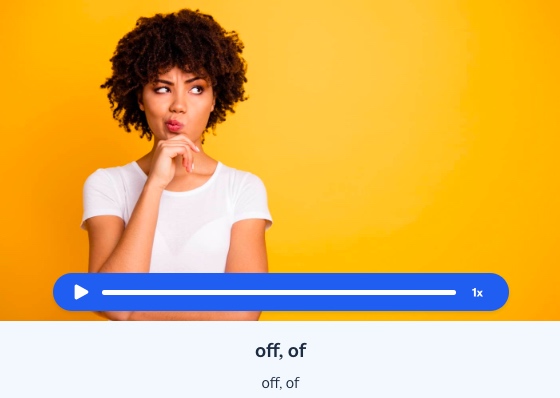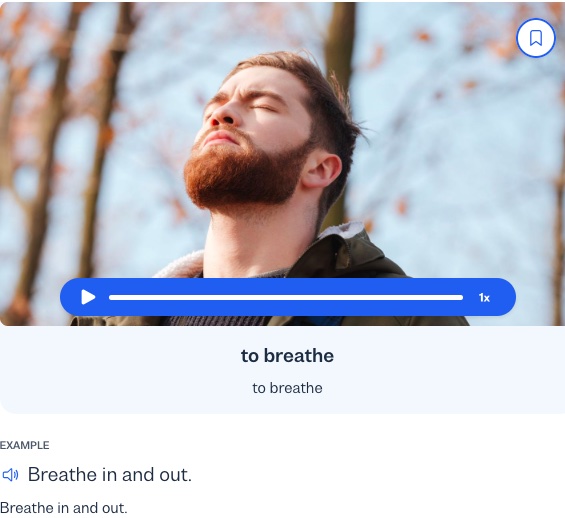20 of the Most Confusing Words in English Language
Even native speakers struggle with these words!
I want to learn...
English is full of confusing words. Words that sound, look, or mean the same. Words that even native speakers get wrong all the time.
In this article, you’ll read all about 20 of the most confusing words in English and what they mean.
Confusing words in English
There are tons of confusing words in English. To help you make sense of them all, let’s first take a look at the different types of confusing words. These words cause problems for everyone — not just language learners.
Words with similar meanings or spellings
When words share similarities, they become confusing. For example, “desert”, and “dessert” have completely different meanings and pronunciations. But their spellings are similar enough to confuse. Or “accept” and “except” which have similar pronunciations but different spellings and meanings. Or “advice” and “advise” which have similar meanings (and pronunciations) but are different parts of speech.
You can see the issue here. These similarities lead to misuse and misunderstandings easily.
Words from different regions
With English being the native language of so many countries, differences in spelling and pronunciation occur. One example is the color “grey” (in UK English) or “gray” (in US English).
Homonyms
Homonyms are another type of confusing word. Whereas the words above share similarities. Homonyms share the exact same things. There are two kinds of homonyms.
Homophones
Homophones are words that sound the same but have different meanings. They may also have different spellings. Examples include "bare" (an adjective meaning naked or a verb meaning to take clothes off) and "bear" (a noun for the animal and a verb which means endure).
See what I mean? It’s confusing. The two words sound the same. They have different spellings. And there are four different meanings.
Homographs
Homographs are words that share the same spelling but have different pronunciations and meanings, like "bow," which can refer to a tied ribbon or the act of bending at the waist. Or "lead," which can mean a type of metal or the action of guiding.
20 of the most confusing words in English
Let’s take a look at some of the most confusing words in English. These are words that are responsible for many of the mistakes and misunderstandings people make. And remember, we’re not just talking about language learners here. Native speakers struggle with these words all the time.
1. Affect vs. effect
OK, I admit it — I never could get these two correct. Every time I use the wrong one (maybe I’ll learn something by writing this article). “Affect” is a verb which means to influence something. “Effect” is a noun that means the result or outcome of something.
2. Complement vs. compliment
These two words have the exact same pronunciation but different meanings. “Complement” can be a noun or a verb that means something that completes or goes well with something — people often use this when talking about clothes and fashion. “Compliment” can be a noun or verb which means a polite expression of praise or admiration. Just to add to the confusion, when they’re nouns, they have the same pronunciation. When they’re verbs, they have the same pronunciation.
3. Principal vs. principle
“Principal” is a noun that means the head of a school or organization. It can also be a sum of money lent or invested. “Principle” is a noun that means a fundamental truth that serves as the foundation for a system of belief or behavior.
4. Stationary vs. stationery
“Stationary” is an adjective which means not moving. “Stationery” is a noun that means writing and office materials.
5. Desert vs. dessert
These two words kind of look the same and sound the same. But unlike homonyms, they’re not exactly the same. Just enough to confuse. “Desert” is a noun that means a hot, sandy, and dry land. “Dessert” is a noun that means a sweet course eaten at the end of a meal.
6. Advice vs. advise
These two words have similar meanings, similar spellings, and their pronunciation is not too different either. “Advice” is a noun that means guidance or recommendations for the future. “Advise” is a verb that means to offer suggestions or recommendations.
7. Loose vs. lose
“Loose” is an adjective that means tightly fixed in place. “Lose” is a verb that means you can’t find something you had before. Or to not win a game.
8. Ensure vs insure
“Ensure” is a verb that means to make sure something will happen. “Insure” is the verb for insurance — you arrange to get some money if there is damage to your property.
9. Learnt vs learned
These are the same word — they both are the past tense form of the verb “learn.” The confusion comes because of the different regional spellings. “Learnt” is common in UK English. “Learned” is common in US English.
10. Breathe vs. breath
“Breathe” is a verb that means to take air into your lungs and then exhale it. “Breath” is a noun meaning the air taken into your lungs. Or one cycle of inhaling and exhaling air. You can see why this word is confusing.
Relax! English won't confuse you for much longer!
Take a deep “breath” and “breathe” in and out while you learn vocabulary with Busuu’s Vocabulary Trainer and Vocabulary Review tools. Study the words you need at exactly the right time with their powerful AI features. Oh, and you can do it on your phone, anytime, anywhere.
11. Lie vs. lay
This one is especially tricky. “Lie” means to put yourself in a horizontal position, like in bed. “Lay” means to put something or someone else in a horizontal position, like putting your phone down on a table. Even native speakers misuse these verbs so don’t worry if you haven’t mastered them yet.
12. Defence vs defense
Here’s another one of those regional spelling differences. “Defence” is UK English and “defense” is US English. Whether to use a C or an S in similar words is difficult. Another example is “licence” vs. “license.” In UK English “licence” is a noun and “license” is a verb. In US English “license” is both noun and verb. “Practice” and “practise" follow the exact same rules.
But, don’t worry too much about which one you use. UK English speakers will still understand what you mean if you use “defense”. The same goes for US English speakers if you use “defence.”
13. Capital vs. capitol
“Capital” has several meanings. It can be an adjective meaning an uppercase letter — like at the start of a sentence. It can be a noun meaning financial assets. And it can be a noun meaning the city that is the seat of government in a country: Tokyo in Japan, London in the UK, etc.
People often confuse this last meaning with “capitol” which is a building where the government meets to do work. The “capitol” is in the “capital” but their meanings are different.
14. Precede vs. proceed
“Proceed” relates to forward motion (either beginning or continuing an action) and “precede” relates to something coming before something else.
15. Elicit vs. Illicit
Despite their similar pronunciations, these words have very different meanings. “Elicit” is a verb that means to draw out a response or answer from someone, like when a teacher asks a question to a student. “Illicit” is an adjective that means against the law or rules.
16. Vain vs. vein
“Vain” is an adjective that means having a high opinion of one's appearance or worth, like young people who always check themselves out in the mirror. “Veins” are the blood vessels that carry blood back towards your heart.
17. Brake vs. break
“Brakes” are what you use on your car or bike to slow down and stop. “Break” as a noun means a pause in work (or any other activity). “Break” as a verb means to damage something, to separate it into different pieces.
18. Peace vs. piece
“Peace” means tranquility, or freedom from disturbance. It can also mean a period with no war. “Piece” is a part of an object, like a piece of pizza.
19. Emigrate vs immigrate
“Emigrate” means to move away from a country to a new country. “Immigrate” means to move into a country from somewhere else. These are so similar in pronunciation, spelling, and meaning that native speakers struggle with these a lot. To make it clearer, think of it like this: “Emigrate” is leaving, and “immigrate” is entering.
20. Further vs farther
I’m going to be honest with you here — before writing this article I had no idea these words were different. I thought they were just different spellings of the same word. Well, I was wrong. But it’s not a simple difference.
When they’re adverbs, they both mean more distance. When they’re adjectives they can both mean more. But “further” can also mean more. Finally, “further” can be a verb which means to progress.
Learning English vocabulary is a challenge
English is full of confusing words. Don’t be down if you don’t know them all yet. You’re not alone. Even native speakers (I wasn’t kidding when I said I struggle with numbers 1 and 20 from the list) get these mixed up.
You can master even these 20 most confusing words. You just need the right mindset and tools. Have a growth mindset and learn from your mistakes. When you’re interacting in English, look for people’s reactions and check to see if they understand you. If they don’t, reflect upon why. For tools, Busuu’s Vocabulary Trainer helps you learn and review vocabulary.
Master English vocabulary
With Busuu, you're just a few swipes away from AI tools to help you remember vocabulary, free online courses, and millions of native speakers and language learners to interact with. Master English vocabulary in your own way, on your own schedule.

